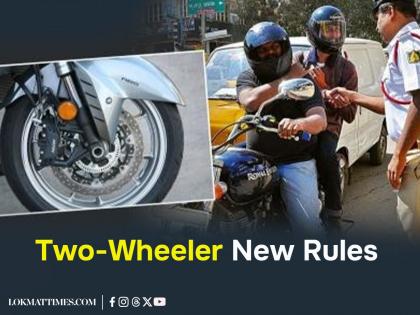New Two-Wheeler Rules: ABS and Two Helmets to be Mandatory for All New Two-Wheelers from 2026; Centre’s Big Move to Curb Road Accidents
By Lokmat English Desk | Updated: June 20, 2025 14:26 IST2025-06-20T14:19:56+5:302025-06-20T14:26:07+5:30
In a major push to reduce road accidents and improve rider safety, the Ministry of Road Transport and Highways ...

New Two-Wheeler Rules: ABS and Two Helmets to be Mandatory for All New Two-Wheelers from 2026; Centre’s Big Move to Curb Road Accidents
In a major push to reduce road accidents and improve rider safety, the Ministry of Road Transport and Highways has announced a significant new mandate. Starting January 1, 2026, Anti-lock Braking System (ABS) will be mandatory for all new two-wheelers, including both scooters and motorcycles, regardless of engine capacity. Along with this, it will also become compulsory for manufacturers to provide two BIS-certified helmets with every new vehicle sold. This decision is part of the central government’s broader strategy to minimize fatalities caused by poor braking control and lack of head protection.
Currently, ABS is only required on two-wheelers with engine capacities of 125cc and above, which means around 40% of the bikes on Indian roads do not feature this critical safety system. However, with the new rule, all newly launched two-wheelers from 2026 onward will be required to include ABS, regardless of engine size. This step was taken in response to the alarming rise in road accidents and associated deaths. The ministry believes that equipping all two-wheelers with this braking technology will significantly improve braking efficiency, especially under sudden stops or on slippery roads.
ABS (Anti-lock Braking System) is a modern safety feature that prevents the wheels of a vehicle from locking up when brakes are applied suddenly. This ensures better grip and stability while braking and minimizes the chances of skidding. Without ABS, sudden braking can cause the rider to lose control of the vehicle, especially on wet or uneven roads. By preventing wheel lock-up, ABS helps the rider maintain control, reducing the risk of serious accidents. It is especially important in a country like India, where varied road conditions, heavy traffic, and unpredictable obstacles are part of daily riding.
Also Read: Preparing For Job? 20 Interview Questions You Must Know — And How to Answer Them Confidently!
According to multiple studies, ABS can reduce the risk of two-wheeler accidents by 34% to 40%. When a sudden brake is applied without ABS, the vehicle's balance can be lost easily, leading to crashes. ABS reduces this risk significantly by maintaining traction and steering control. Road safety experts have long advocated for its universal implementation, especially as two-wheelers form the largest share of India’s vehicle population. Making ABS mandatory across all models is expected to save thousands of lives each year and significantly lower the number of road mishaps involving motorcycles and scooters.
The government has also addressed another key factor contributing to two-wheeler fatalities - the lack of proper head protection. From 2026, all new two-wheelers must come with two BIS-standard helmets at the time of sale. Currently, manufacturers are only required to provide one helmet. Statistics reveal that 44% of road accident deaths in India involve two-wheeler riders, with head injuries being the most common cause. By mandating two helmets, the government aims to ensure that both the rider and the pillion passenger are protected. The move has been widely welcomed by road safety advocates and traffic authorities across the country.
Open in app